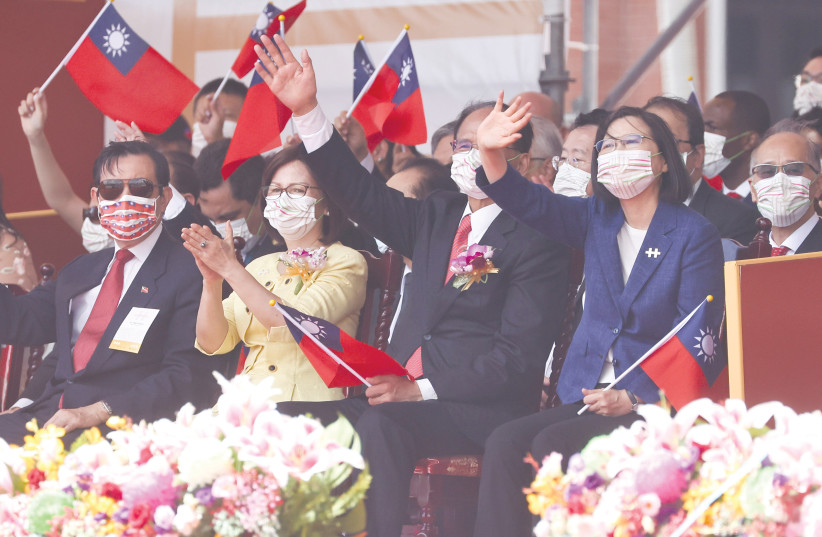As the world reels from Russia’s brutal assault on its neighbor Ukraine, concern continues to grow further east that China may follow suit with Taiwan. Similar to Ukraine, Taiwan has been standing boldly for democracy in the face of an authoritarian superpower neighbor. Rest assured that China is watching closely how the world reacts to Putin’s efforts to expand Russia’s territory.
In recent months, China has taken increasingly aggressive action against Taiwan, invading Taiwanese airspace and issuing statements about the need for “reunification” with China. Indeed, China’s Xi Jinping has made taking back autonomous (and of course, democratic) regions like Hong Kong a foreign policy priority, brutally suppressing dissidents and democracy activists in Hong Kong. Xi has also expressed on multiple occasions his desire for the Chinese Communist Party (CCP) to control Taiwan.
Within hours of Putin’s invasion of Ukraine, nine Chinese aircraft entered Taiwan’s air defense zone, causing alarm in the tiny island. This is becoming an increasingly regular occurrence for China, which refuses to acknowledge the independence of Taiwan.
Last week, I sat down with Taiwan’s new ambassador to Israel, Abby Ya-Ping Lee, to discuss what Russia’s war with Ukraine means for the future of the region.

Can you break down recent events in Ukraine from Taiwan’s perspective? What does it mean for China?
It is worrisome to see there are similarities in rhetoric and actions between Russia and China when they talk about Ukraine and Taiwan issues. Russia claims that Ukraine historically belongs to Russia, so it is entitled to restore the land in order to revitalize its national glory.
This is the same as China’s false claim that Taiwan is part of China. Its ultimate political goal is to accomplish the Chinese dream of the great rejuvenation of the Chinese nation.
We also see Russia and China modernizing their militaries, and at the same time launching massive cyber attacks and disinformation campaigns in Ukraine and Taiwan to sabotage peoples’ trust in their governments.
China has been watching how the West reacts to Russia’s aggression, to learn what it might encounter if it launches attacks against Taiwan. We are concerned to see Russia’s aggression toward Ukraine emboldening China’s expansion of aggressionism. If you look at how China militarizes the South China Sea, you will know its ambition and objective is beyond Taiwan.
What is Taiwan expecting and how are you as a nation preparing?
Even though the Taiwan Strait separates the island of Taiwan and China, providing a 100 km.-protective line, the Taiwan government continues to ensure the safety of Taiwan while keeping an eye on the situation in Ukraine. Our armed forces were instructed to more closely monitor the situation across the Taiwan Strait and keep refining our military readiness.
We continue to boost the defense capabilities in the asymmetric warfare, mobilize civilian defense, and purchase defensive arms from the US, in line with the Taiwan Relations Act [a congressional act to help maintain peace, security and stability in the Western Pacific] and the Six Assurances [key foreign policy principles regarding US-Taiwan relations].
In addition, the Taiwan government has paid attention to “cognitive warfare.” We keep alert to the overseas power of local agents who might use the Ukraine crisis or false news to sway public opinion in Taiwan.
Taiwan is committed to self-defense capabilities and forming the solidarity of Taiwanese people, while also looking forward to more support and cooperation with fellow democracies.
What can be done to prevent an escalation to war in Taiwan?
It takes two to make peace. Taiwan has never provoked conflict. President Tsai Ing-wen has reiterated her political will to ensure the safety of Taiwan and her willingness to dialogue with the Chinese government in order to maintain the status quo and contribute to regional peace. Her consistency has been praised by the international community.
I also want to highlight the importance of maintaining freedom of navigation in this region. We are pleased to see that the US posture in Asia remains strong and is committed to the freedom of navigation to ensure a free and open Indo-Pacific. This effort was also joined by Japan, Canada, Australia and Holland.
What will Taiwan’s response be should China violate the sovereignty of Taiwan?
We are not provocative, but we don’t bow to pressure, be it diplomatic or military. We cherish our way of life and are committed to upholding our hard-earned democracy and freedom. To us, surrender is not an option.
What would be the consequences of China attacking Taiwan?
Any responsible and peace-loving country doesn’t want to see it happen. Taiwan is located in the first island chain and has very strategic importance. Taiwan’s chip manufacturing takes up more than 60% of the global market share. If China launches an attack against Taiwan, not only will the global supply chain be disrupted, but also China will hurt itself badly.
The democratic community will stand up to aggression that jeopardizes peace and stability. The cost for China would be very high. It is not optimal for its political agenda.
FROM LEE’S comments, it certainly doesn’t seem to be in China’s interest to take action against Taiwan today. But it is also very clear from China’s previous actions that they are driven by an aggressive anti-democratic agenda.
China is also more economically powerful than Russia. While the global pushback against Putin’s assault on Ukraine has been a positive sign, will the global consequences facing Russia be enough to deter China from taking similar action against Taiwan?
The international community must learn from the example of Ukraine and prepare for such a possibility. It must take appropriate steps now, rather than “if and when” China takes action against Taiwan – another democratic ally of the West.
The writer is the CEO of Social Lite Creative.
